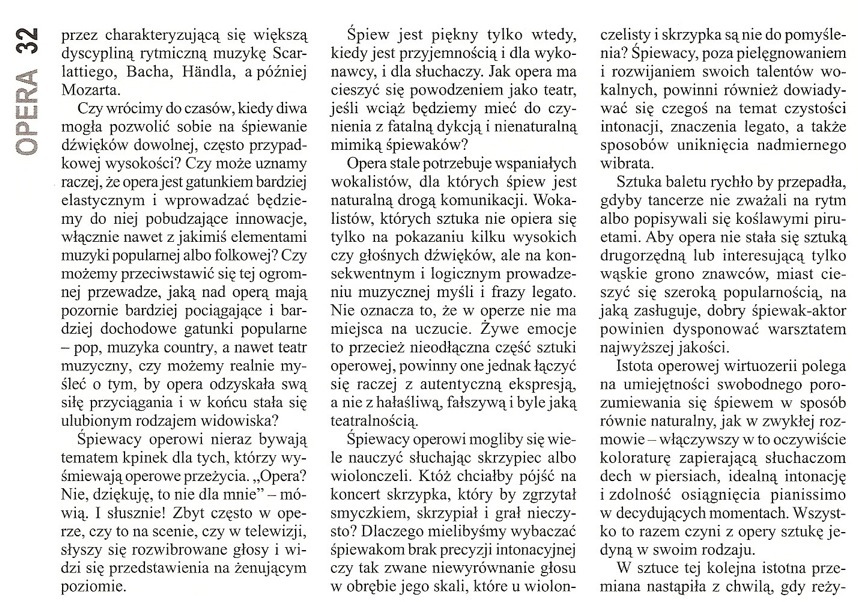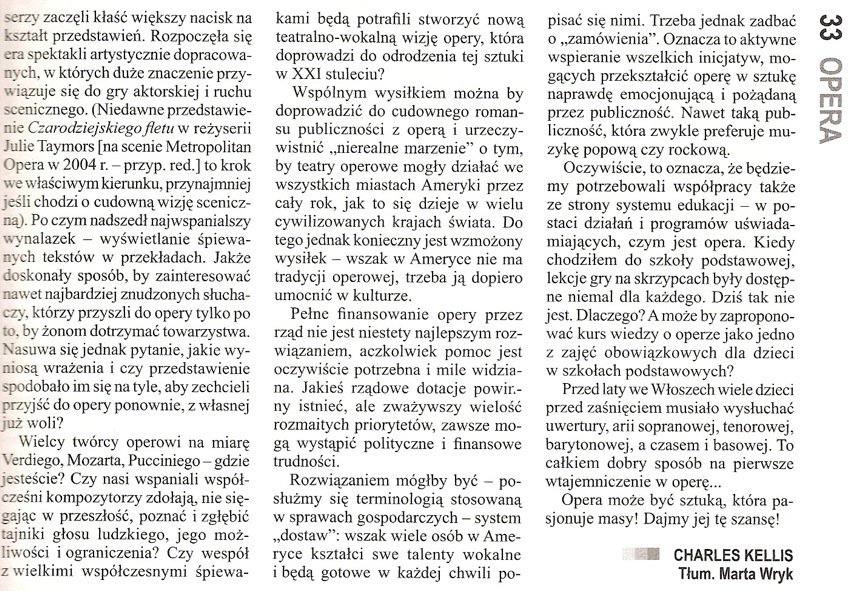CHARLES KELLIS


TWOJA MUZA (February - March) 2012/ English




IT WAS WELL WORTH THE WAIT
by Charles Kellis
The much anticipated performance of "Don Giovanni" starring the Polish baritone Mariusz Kwiecien finally came to pass on Tuesday night the 25th of October.
The premiere performance of "Don", was created especially for this superb baritone as a vehicle to introduce to the met audiences, what has become his signature role throughout Europe, and Asia. Unfortunately, Mr. Kwiecien, having injured his back with a herniated-disc during the dress rehearsal, was unable to sing the premiere performance. Last night, however, after high anticipation, engaging suspense and then also some increasing concern that there may again be a parting of the Met curtain with an announcement of cancellation, we finally had the pleasure of actually hearing him, hopefully healthy again and seemingly completely recovered. Despite undergoing an operation two weeks before, the moment finally arrived. He courageously delivered a performance of varied inspirational virtuosity, together with many splendid theatrical insights in the art of womanizing and his uncanny ability to portray the Don as unabashedly ruthless --yet still suave and calculatingly sincere, particularly in his dealings with Zerlina. The manner in which he sang "Deh vieni alla finestra" was testimony to his formidable technical abilities. He produced a real Italianate mezza-voce, that we haven't heard from in a baritone at the Met since the days of the basso -Ezio Pinza. It was a pleasant throw back to the bel-canto era when the use of mezza voce was effectively used as an expressive vehicle of subtle emotional impact.
The rest of the cast was questionable with some fine moments dispersed with numerous flawed periods of unfortunate, unfocused vocalism. The much publicized Barbara Frittoli displayed every bit of the love-hate characterization of Elvira one could hope for. Her acting and her concept of the role were impressive and in the recitative of "In quali eccesi...", she delivered an exemplary execution of the musical and emotional content. When she began the aria "Mi tradi", however, she showed signs of obvious strain and discomfort. Mozart was known for punishing the soprano voice and this is certainly one of those arias, but after all, this is the Metropolitan Opera. It should be sung with the finesse and dignity of a competent soprano and we should expect nothing less than a polished, well focused account of major arias, regardless of their inherent difficulties. Otherwise Ms. Frittoli managed to portray her role with the experience of an operatic career that has been blossoming for the past few years.
The tenor Ramon Vargas was rather lackluster in his entrance with Donna Anna, but with the aria "Dalla sua pace" he arrived at his best singing of the evening. This aria would seem easy enough when you see it written in the score, but can actually prove to be very difficult if not handled properly and he beautifully dispatched a very effective rendition of soft legato, reminiscent of the late Feruccio Tagliavini. His second aria "Il mio tesoro" was also quite successful, adding a lot of breath capacity to connect the coloratura passages with the smoother legato lines. This shows what a singer can do with a rather ordinary voice and a lot of available technical facility. Marina Rebeka the Donna Anna, although she shows good potential, still seems to be in a formative stage of her development. She needs to learn more about singing with a smooth line and to refine some of her somewhat strident upper notes. She did manage, however, in "Non mi dir" some occasionally lovely phrases that showed her really creamy, beautiful voice to good advantage.
Although her Zerlina was adequately portrayed, particularly in her teasing interaction with Masetto -- Mojca Erdmann's singing was marred by some ineffective articulation and her voice did not properly project in the singing of her two big arias. An interpolated high "c" that --although by itself was quite good -was not good enough to save her overall under-par performance. LOL, in this case means "lack of legato". Luca Pisaroni's Leporello was a stand out with his perfectly timed singing of "Madamina", the catalogue aria, offering a list of Giovanni's various conquests to Elvira. He is a good actor; Otherwise his voice, which should be very well suited to numerous other roles, was lacking the usual comedic, more Basso sound associated with the (servant) Leporello -in contrast with Mozart's original concept that the role of Don Giovanni should be sung by a Baritone.
The production was brought to a final climactic theatrical wonder of fireworks that ushered in a thunderous conclusion to an overall satisfying "Don Giovanni". This was in large part due to Mariusz Kwiecien who --undaunted by his recent operation - decided that the show must go on. His interpretation of the Don was inspiring, with his in-depth grasp of the outward exhibition of abandon and fearlessness, coupled with the essence of inner conflicts of impending doom and foreboding destruction. His voice, a little tentative at the beginning of the opera, continued to grow and was most effective in the last act when it took on the shine and virility associated with his wonderful singing that brought him to a career of International acclaim. His destiny will probably prove to his being remembered as one of the great singing
actors in operatic history.
The sets, although they painted a rather dull atmosphere, were designed to include Michael Grandage's wonderful stroke of genius --depicting the many various Giovanni conquests --culminating in practically all of the six hundred and forty women, seduced by Don Giovanni, in Italy ---sitting in their windows during the singing of Leporello's catalogue aria, Madamina--cleverly enhanced by the interplay between Leporello and Elvira . This was a real Grandage "coup d'etate"-- one of the highlights of this quite entertaining
evening of tragic proportions.
Mozart's characters are strategically -interwoven with emotions that he magically connects with musical themes--almost foreshadowing the "leitmotivs" of Wagner. His masterly musical depiction of Leporello's "Madamina", the indignation of Donna Anna, the love-hate of Donna Elvira, the imaginative development of the essence of Don Giovanni, Zerlina's flirtatious charm and later manipulation of Masetto are all a testimony to Mozart's keen ability to unite words with music. Michael Grandage managed, together with input from Maestro Fabio Luisi, to honor the score as it progressed seamlessly --capturing the original intent of Mozart -also adding some wonderful theatrical nuances that Mozart would have undoubtedly loved.
FINE


